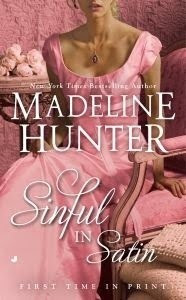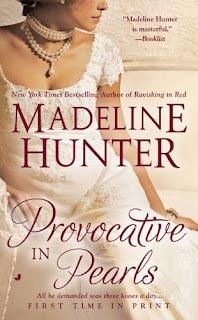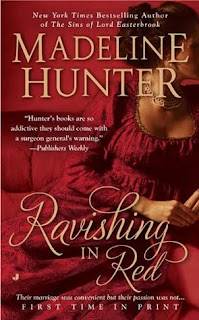 Judith‘s review of Sinful in Satin (The Rarest Blooms, Book 3) by Madeline Hunter.
Judith‘s review of Sinful in Satin (The Rarest Blooms, Book 3) by Madeline Hunter.
When famed London courtesan Alessandra Northrope passes away, her daughter Celia Pennifold inherits little more than a hopelessly contaminated reputation, a house in a middle class neighborhood, and an education that prepared her to take her mother’s place the way Alessandra intended. Celia hopes to make her own life on her own terms, however, and moves into the house only to discover one more legacy—an enigmatic, handsome tenant who knows her mother’s plans for her future rather too well.
Jonathan thinks he is on a simple mission to discover whether Celia’s mother left accounts of her lovers that might embarrass important men. Instead he finds himself embroiled in a mystery full of dangerous betrayals and secrets, old and new, that touch on his life as well as Celia’s.
This is the third novel in a series about four women who have been trammelled by society and life, all of whom were housed in a country estate called “The Rarest Bloom.” The owner of the property opened her doors to these other three because there really was nowhere any of them could hope to find some kind of shelter, not only for the forces of nature, but from the anger, wounds and gossip of a wicked society, and from financial ruin. All had agreed that their reasons for taking up residence there would remain their own secret unless they chose to reveal it. There was to be safety and security and freedom from social pressure. Now Celia Pennifold must come forth from this “cocoon” and begin to take charge of her mother’s estate and to face the gossips and the inuendoes that not only surrounded her mother but try to establish a life for herself as an independent woman. The plush town house where he mother entertained has gone to repay debts. Celia takes up residence in a quiet neighborhood in a house her mother owned, a place where she could be hidden and quiet and unknown. It is here that Celia tries to establish herself as a business woman in partnership with her friend Daphne of The Rarest Bloom, acting as a London distributor. It is her hope that she will be able to take her small savings from her living allowance, merge it with some income from the partnership with Daphne, and be able to support herself, her house, and a few tenants/assistants who will cook and clean–both of whom are former whores who have been abused and who are without any resources now.
I found Celia to be a fascinating woman–one who had learned the hard way that having a good reputation and character, intelligence and beauty made no difference to “people of quality.” The only facet of her life that mattered was her relationship to a famous “lady of the night.” Her mother had groomed her to be the shining star of the demimonde or “the half world” where call girls, mistresses being supported by “protectors” and street walkers lived. At age 17, Celia’s mother had even chosen her first “protector” and it was then that Celia realized that no marriage, no children, so socially accepted life awaited her. It was then that she ran away to Daphne’s establishment in Middlesex and lived there for five years. In spite of her disappointment and her disillusionment, Celia had grown up in many ways, and now she knew that two of her former companions who had married titled gentlemen could no longer welcome her into their homes. She accepted this with grace, knowing that this was the reality of her life. Even after she fell in love with Jonathan she knew that there could never be anything between them other than an affair of the heart. How could he ever hope to regain his title and be accepted by the ton with her as his wife? Even so, Celia was just so unflappable. Only when she thought Jonathan had betrayed her or when her previously unknown father refused initially even to see her or speak with her for more than five minutes, was her spirit crushed and her heart broken.
Here is where the reader should never assume–never sell a character short. Jonathan, mysterious and enigmatic figure that he is, has seen every facet of life and human society–the best and the worst. He is living in Celia’s house because of a verbal arrangement with her mother, and he is in no hurry to leave. There is far more to this man than meets the eye. Even when Celia initially tries to get him to leave, he retains his rooms in her house, protecting and assisting, just being a presence whenever someone came calling, and from time to time working on her behalf through his contacts with old university chums, some of whom have been featured in the two previous novels in this series. He has been seeking acknowledgement as the illegitimate son of the Earl of Thornridge. For eight years he has also been an investigator for the British Home Office and is even now seeking some evidence that Celia’s mother did not act treasonously during the Napoleonic War. He comes across as a kind, generous, caring, genuine gentleman, one who knows who he is, has accepted this, but who is not afraid of pursuing truth on his own behalf and that of his friends.
This novel explores the world of the demimonde, the society that tolerates sexual excesses on the part of men and refuses to accept the same for women. It is a world that tarnished everything it touched, and in Celia’s case, it mattered little that she had never taken a lover. It was assumed that she would one day be a courtesan as was her famous parent. The daily life she experienced and in which her two women assistants had lived were filled with raw hurt and self-destroying disregard for them even as human beings. They were used and when they were used up, they were thrown away. Jonathan’s friend, the Duke of Castleford, has a whore in his bed-maybe even several in one day, for six nights a week (he abstained on Tuesdays). His attitude was typical of those who had way too much money and way too much time on their hands.
Once again Ms Hunter has demonstrated her well-known story-telling ability in this novel. The plot is different, the characters are forceful and real, and the conflict that Celia encounters from numerous sources rings true to the times. These are people I don’t think any of us would mind knowing in real life. They were people who lived realistically, made decisions that not only represented their values, but also tried in everyway to be sensitive to the lives and reputations of the people about whom they cared deeply. Yet they seemed to be able to take whatever society threw at them. I think one could say they had “pluck.”
So I recommend this novel to historical romance lovers. Hunter’s two previous books were excellent and I believe that this book carries on that level of exceptional novel writing. It is well-worth the time and effort to read.
I give this book a rating of 5 out of 5.
This book is available from Berkley. You can buy it here or here in e-format.
You can read more from Judith at Dr. J’s Book Place.
The series:







